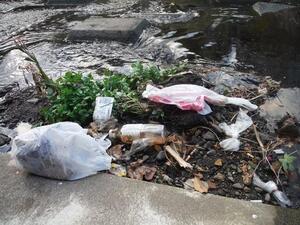- Yokohama-shi Top Page
- Lifestyle and procedures
- Housing and Living
- Waste and Recycling
- Data, brochures, sound sources
- Data
- Other Investigations
- Survey of Scattered Waste on Rivers and Urban Areas
Here's the text.
Survey of Scattered Waste on Rivers and Urban Areas
Last update date August 9, 2023
Latest Survey Results
Yokohama City participated in the activities of the Waterside Protection Association and investigated garbage scattered in rivers.
What is the problem of garbage scattered on rivers and urban streets?
Causes of garbage scattered on rivers and urban areas
The main cause of scattering of garbage is illegal dumping, including littering, but garbage scattered in rivers is not only littered on the spot, but also washed away from the upstream or discarded on the street. There are many things that have been washed away by the weather.
In addition, even if the garbage is properly put out at the collection site, if measures to prevent scattering are insufficient, it may cause scattered garbage due to wind and rain.

Problems caused by scattered garbage
It is said that places where garbage is falling will induce further littering, and there are problems such as falling into a vicious cycle in which garbage calls garbage, and poor living environment and landscape.
However, not only that, scattered garbage on the streets, etc., flows out into the ocean via rivers, causing marine debris. In particular, plastic garbage can cause death due to sea turtles and seabirds accidentally eat food or get entangled with the body.
In addition, deteriorates and fragmentation by ultraviolet rays, etc., it becomes a source of microplastics easily adsorbed residual organic pollutants (POPs) such as PCBs, and fish that ate microplastics eat such pollutants. There is concern that harm will be harmed by taking it into the body (marine plastic problem, microplastics).
Measures on land and rivers are important in order to reduce the outflow of waste into the ocean. Therefore, first, we conducted a survey on scattered garbage on rivers and urban streets in order to understand the actual situation.
Survey results
Outline of survey
| Name of survey | Investigation method | Survey site |
|---|---|---|
| River waste survey | Investigate the garbage collected by the Waterfront Protection Association (Note 1) in the middle basins of the four rivers in the city | Itachi River |
Waste survey on streets in downtown and office districts | Investigate the garbage collected by cleaning the streets around the station | Around Kannai Station |
Note 1: It is a volunteer to clean up rivers and waterfront facilities approved by Yokohama City. In the river waste survey, the following four organizations cooperated.
- Tachi River (Tenjinbashi to Shimbashi) Waterfront Protection Association
- Izumi River Moguri Bridge Waterfront Protection Association
- Hodogaya-juku Matsunamiki Promenade Waterfront Protection Association (Ima Igawa)
- Samurai Waterside Protection Association
Specifically, please see Yokohama-shi HP "waterside protection society".
Survey results and data
| Name of survey | Outline of results |
|---|---|
| River waste survey | On average for the seven times from 2018 to 2020, plastics accounted for about half of the garbage, and disposable plastics such as plastic bottles and containers and packaging accounted for half. |
| Waste survey on streets in downtown and office districts | On average five times from FY2019 to FY2020, plastics accounted for about 20% of garbage, and disposable plastics such as plastic bottles and containers and packaging accounted for more than 80%. |
From both surveys, it can be said that measures are important to reduce scattered garbage: PET bottles, plastic containers and packaging, tobacco, and cans.
FY2022 Itachikawa Survey Results (PDF: 324KB)
Past survey results
Details of survey results (from FY2018 to FY2020) (PDF: 1,060KB)
What we can do
Marine waste is not a distant problem for us. There are reports that most marine debris flows from land, and the cause starts from familiar places. Measures on land and rivers are important to reduce the amount of waste into the ocean.
There are things that each of us can do:
- Don't litter. Take the garbage left on the go home, separate it and throw it away properly.
- Don't dump illegally. Garbage from daily or work should not be left behind and disposed of properly.
- When discarding garbage, take measures to prevent it from being washed away by wind or rain. (In the collection area, put the net tightly and tie the bag tightly, etc.)
- Pick up the falling garbage. (Participate in garbage collection SNS, events, community cleanup activities, etc. (Example:Waterfront protection societyCleanup activity SNS "Thank you! (Yokohama Cleanup))
- Use as much waste as possible. (My bottle spot)
In order to open PDF files, you may need a separate PDF reader.
If you do not have it, you can download it free of charge from Adobe.
![]() To download Adobe Acrobat Reader DC
To download Adobe Acrobat Reader DC
For inquiries to this page
Policy Coordination Division, Resources and Waste Recycling Bureau Policy Coordination Department
Phone: 045-671-4565
Phone: 045-671-4565
Fax: 045-550-4239
Email address: sj-chousa@city.yokohama.jp
Page ID: 651-415-964







